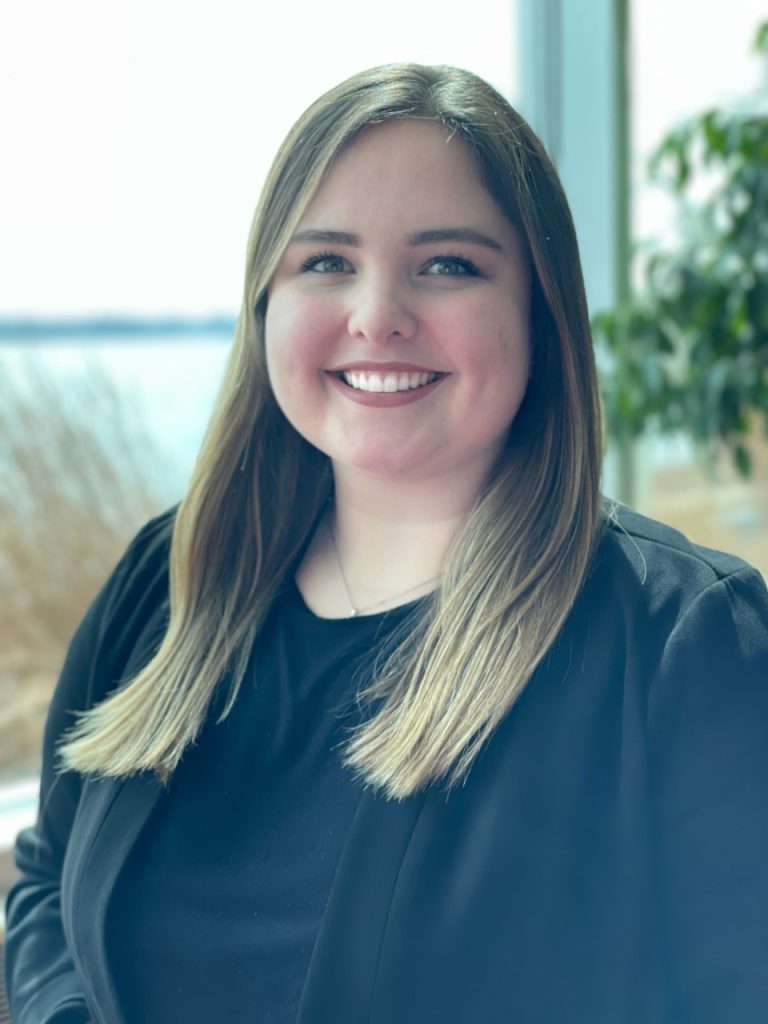
Concordia University Wisconsin loves to hear updates from alumni. Last year, graduate Karina Rauenhorst, shared her story as a School of Pharmacy student. In the time since graduation, Karina has been busy with her residency and being active in the pharmacy community. Let’s catch up with her and see where she’s headed.
Where are you practicing during your residency?
I started my residency in July 2022 at Progressive Community Health Center, an ambulatory care clinic that serves the underserved in the Milwaukee area. In my position, I provide health education for patients with chronic health conditions, such as diabetes, hypertension, and hyperlipidemia. My second-year site is yet to be determined.
When not in the clinic, I also teach at CUW in various coursework. Most of my time is spent as a lab instructor for our Applied Patient Care (APC) labs but I have also lectured in Pharmacotherapy coursework. It’s fascinating to learn some of the “behind the scenes” work that goes into the courses that I took only a couple years ago.
What are the most challenging and rewarding parts of the residency?
Navigating the balance of multiple long-term projects from a variety of sources is my biggest challenge. In pharmacy school, most projects were brief, but my two-year residency will involve long-term projects. My program director, preceptors, and mentors on campus have given me the skills needed to manage these challenges, but putting them into practice is a whole new learning process.
The most rewarding part of my residency so far has been the impact I have made on my patients in the clinic. I love the unique opportunity to serve and provide quality care to an underserved population here in Milwaukee. I strive to form a trusting and collaborative relationship with my patients and serve as a reliable resource in their disease state management. Seeing the joy in a patient’s eyes after achieving a health goal, I feel like I am answering my true calling in life.
Continuing to learn
Why did you choose to pursue a Master’s in Education while in your residency?
After graduating with my PharmD I wanted to further develop my teaching skills and enrolled in the Master of Education program at CUW. I found my passion for teaching during my second year of pharmacy school. While serving as a teaching assistant in the APC labs, I knew I wanted to incorporate teaching into my future career. The coursework in my master’s program provides me a foundational framework and essential skills that will help me better connect with and educate future learners.
How have your first classes in the School of Education been so far?
My first class was an elective, Multimedia in the Classroom, and I loved it! I’ve always been passionate about making content engaging and interesting, so this course was right up my alley. Another resident and I sent a presentation suggestion to the AACP, hoping to present the course’s findings at their yearly conference to pharmacists all around the US.
What has been easier and harder than you expected in the Master of Education?
The style of education and learning in the master’s curriculum is different from what I experienced in the PharmD program. The courses have been requiring a lot more insightful reflection, creative writing, and direct application of knowledge, instead of intensive content retention and exams. I’m grateful to not be up late studying various topic materials and taking exams anymore.
I really enjoy the self-paced nature because it allows for flexibility in my already busy schedule. However, this does add to my previously mentioned challenge of managing long-term responsibilities and balancing my schedule.

Being active in the pharmacy community
With the goal of connecting with other professionals in the field, Karina continues to stay active in the Kappa Psi Pharmaceutical Society. Kappa Psi is the oldest and largest pharmacy fraternity. It has the mission to develop leaders with a passion for service to their community while creating lifelong professional connections. Once a brother of Kappa Psi, you become a brother for life.
How long have you been involved with this fraternity? Why should others join?
I was initiated into the Zeta Theta chapter at Concordia University Wisconsin (CUW) in the Fall of 2018. I first heard of Kappa Psi while completing my undergraduate degree at the University of Minnesota – Duluth. The comradery and professional growth mindset sparked my interest. I joined with the goal of meeting new pharmacists from across the world while promoting the profession of pharmacy.
Throughout my time so far, I have been able to:
- Meet some of the most incredible and inspiring pharmacists
- Volunteer for over 200 hours at a local free clinic
- Develop leadership skills that will help me be a better servant to the community
Pledging Kappa Psi has been one of the best decisions I have made in my pharmacy career to date and will recommend joining to everyone.
What are your responsibilities as the next President of the Northern Plains Province (NPP)?
As President of the Northern Plains Province, I oversee 10 collegiate and 6 graduate Kappa Psi chapters across North Dakota, South Dakota, Nebraska, Iowa, Minnesota, and Wisconsin. One of my most significant responsibilities is to organize and facilitate our three-day biannual regional conference for over 200 attendees.
Between these conferences, I arrange regular meetings with the NPP executive board, assign charges to our various regional committees, and establish goals that support our overarching vision for the province. In addition, I serve as a resource to my fellow NPP brothers and represent them to the best of my ability.
Do you have specific initiatives or goals that you want to achieve during your time as president of this fraternity?
The main goal of the NPP executive committee this year is to be innovative with our events while staying true to our traditions. With the recent return to in-person conferences, it’s a pivotal time to enhance the experiences of our brothers while continuing the traditions. It’s our hope that through educational webinars, brotherly competitions, and improved communication throughout the region, we will see an increase in participation and retention by both collegiate and graduate brothers.
Want to find out more?
If you want to learn more about Concordia University Wisconsin’s School of Pharmacy, visit us here.